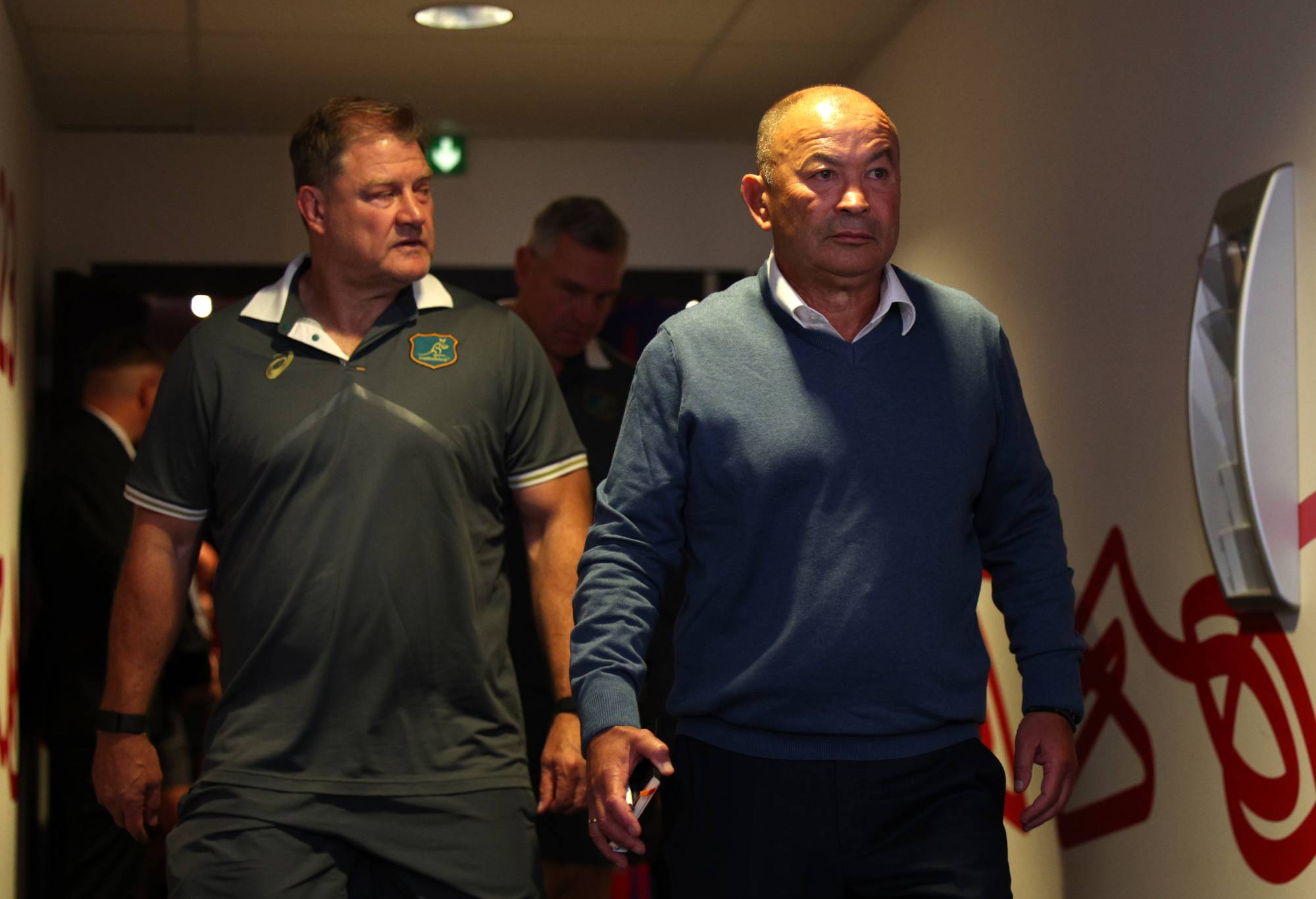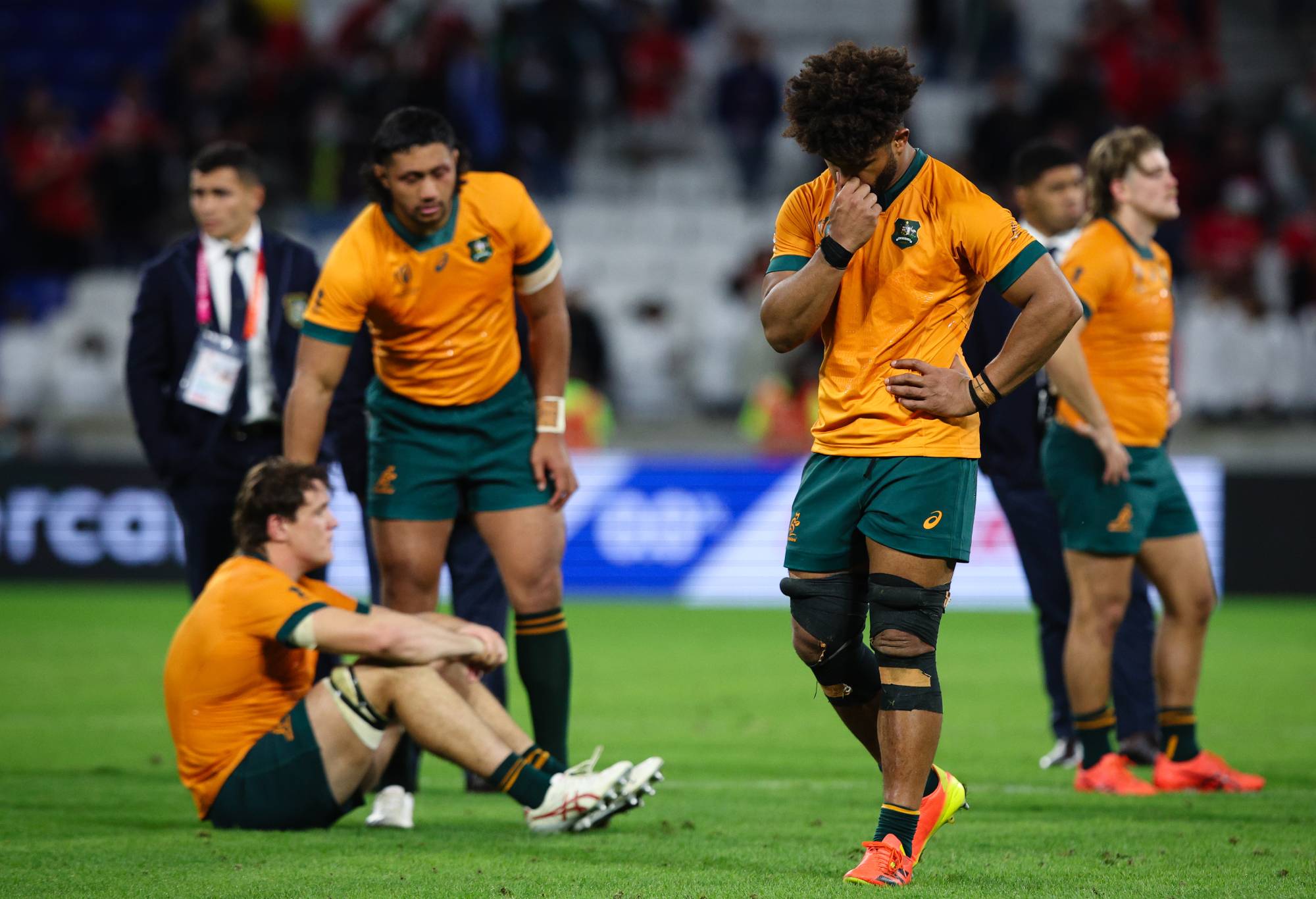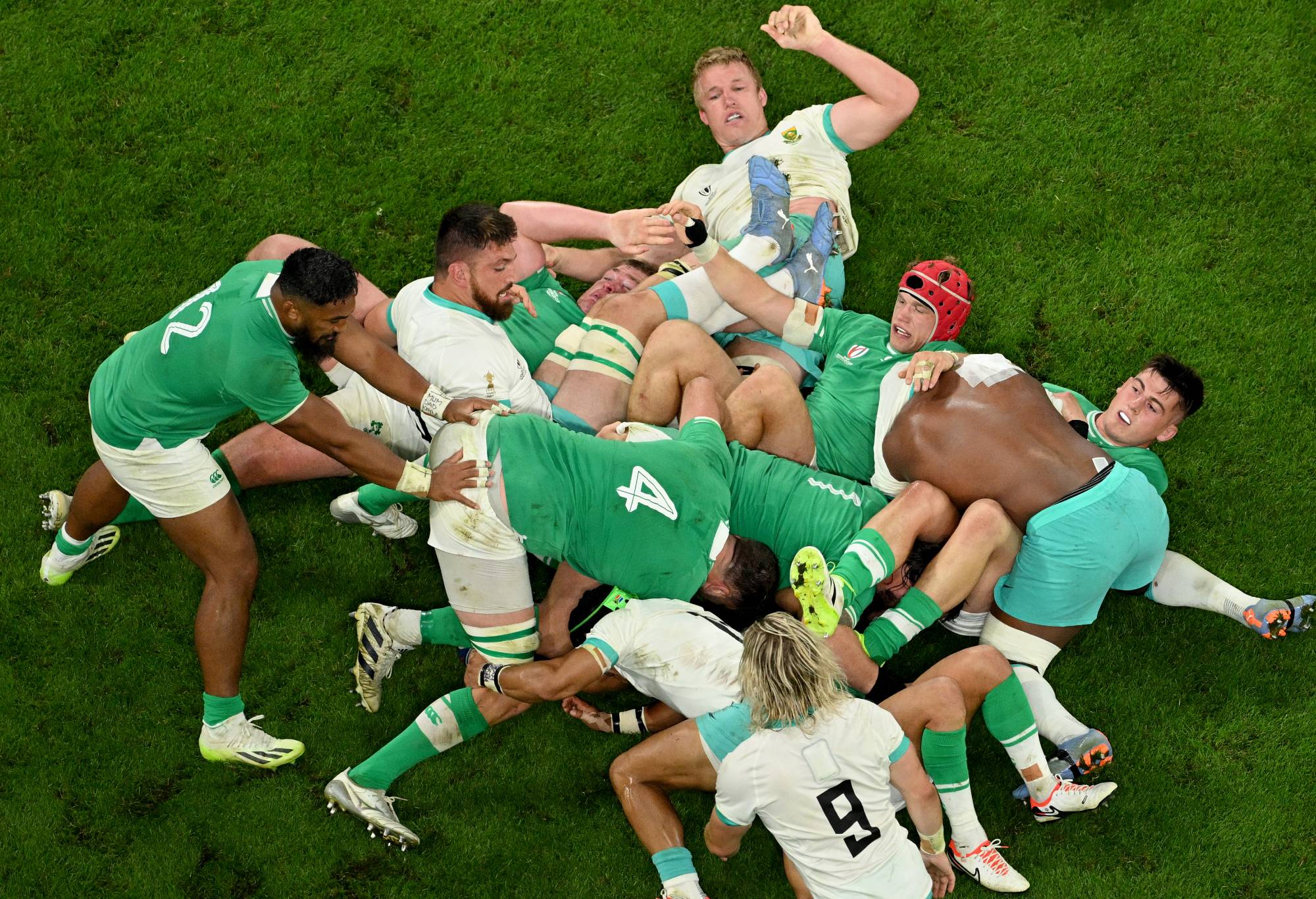In a World Cup that goes for seven weeks, Australia lasted two weeks, one day.
Forget about permutations that might see Australia go through if Fiji lose their last two pool matches. The 40-6 loss overnight to Wales in Lyon means that for the first time in ten iterations, the Wallabies exit before the quarter-finals, with Fiji and Wales set to advance from Pool C.
In the context of Rugby Australia chairman Hamish McLennan claiming that the appointment of Eddie Jones as coach was part of a long-term plan to win the 2027 World Cup, then this outcome can hardly be considered a surprise.
In the context of Jones reportedly seeking out the vacant Japan coaching position – a line of questioning Jones refused to engage in at his post-match press conference – the outcome cannot be considered a surprise.
Australia’s early exit also confirms its current world ranking of 10th – just outside the quarter-finalists in ranking, but considerably farther outside in reality.
That’s where Australian rugby is right now; a mass of mediocrity and confusion. A recipe for everyone invested in the game to be angry at their considerable investment of money and emotion being torched on a wasted World Cup cycle.
The post-mortem that McLennan began last week – while the Wallabies were still alive – can now begin in earnest. It will be emotional and bitter. It is unlikely to be constructive.
As always, the focus will be on Eddie Jones, one of rugby’s great personalities, who coached in two losing World Cup finals, who pulled off the event’s biggest ever upset, in 2015, but who this time leaves the Cup with his side failing to contend.
It is Jones’ modus operandi to make things about him; not because it serves a rampant ego, but because it is his preference to accept responsibility for everything and keep the spotlight off his players. He finds the headlines and the headlines find him.

(Photo by Adam Pretty – World Rugby/World Rugby via Getty Images)
But the failure of this World Cup runs far deeper than Jones’ ability as a coach or selector. Or his ability to deflect.
Yes, the toss will be argued long and hard about missing men, Quade Cooper, Michael Hooper, Len Ikitau and Pete Samu. About swings in game plans. About training loads and an apparent disconnect between coaches, S & C and medical staff.
Important talking points, all of them, but all overtaken by the circus surrounding Jones and his potential early exit, and how the events of the last 12 months since his appointment, have descended into a failure of management and leadership.
The central issue is the process through which Jones was appointed; the timing, the public and private expectation that was placed around that, how and why those expectations were later walked back. And now, if Jones really is about to walk away, what the point of it all really was.
Forget Jones’ mea culpa and insistence that he will face a post-World Cup review. McLennan has already told Australian rugby fans that the selection of such a young, inexperienced squad was to prepare them better for next time. If results this time don’t matter, if winning is withdrawn as a KPI, how can a coach be sacked for losing?
What’s convenient is that by making the coach unaccountable for this result, instead framing a broader 5-year objective, the chairman is effectively pronouncing himself unaccountable as well.
That’s the theory. But by hitching himself to Jones’ wagon, McLennan always left himself exposed should Jones decide to return to Japan. If that were to happen – and there are plenty of people close to the action who believe it will – then McLennan’s position will surely be untenable.
The 2023 World Cup campaign will have been cut-off at the knees, a new coach given insufficient time to reset, to install a credible coaching team, to establish a way of playing, to build any kind of cohesion, for what?
The cost of paying out Dave Rennie? An amount said to be well north of half a million dollars? The cost of throwing young players to the wolves in St Etienne and Lyon, patently unprepared for elite level, World Cup rugby?

Dejection for Australia players. (Photo by Craig Mercer/MB Media/Getty Images)
Jones argued post-match that, as tough as this outcome was, it was the best way to provide his players with the experience they need. But the question remains, if inexperience was a key contributor to this result – throw lack of leadership into that mix – isn’t that a function of Jones excising much of the experience and leadership he had at his disposal when he took the job on?
Australian rugby’s problems run deep and wide. Financial impoverishment, unwieldy governance, provincial imbalances, parochialism, cashed-up domestic codes impacting upon the value of broadcasting rights and talent acquisition, are just some of the key impediments.
For these to be properly addressed, so as to get alignment across the sport; for participants to buy into a centralized model such as Ireland has; above all else, there has to be trust. Trust in the people at the helm of the sport that they have the respect, expertise and the authenticity to bring the game together.
Last week, McLennan was at pains to point out how 20 years of maladministration got us to where we are today. But Australian rugby fans are sick of hearing about what went wrong after the 2003 World Cup.
They want to know how things are going to be made better. And they want to believe, and have trust in, the people who can make things better.
It was McLennan himself who opted not to take a traditional non-executive chairman role, but instead to become the front face for Rugby Australia, in the same way Peter V’Landys is the face of rugby league.
In the three years since his appointment, what are McLennan’s list of achievements? Achieving financial stability might have been said to be one; that is until it became apparent that Rugby Australia not adopting a private equity partner was not so much a matter of choice, but potential investors changing their valuations. Downwards.
Investors love to see upside. But not because the baseline is so low, so far beneath the market, it renders the investment meaningless.
Investors also like predictability. But not the kind where the Wallabies – plagued by discipline problems – give away a penalty at the very first ruck. Two minutes later, Jac Morgan was slicing through the heart of the Wallabies’ midfield, and the foundations were being laid for the Wallabies worst ever World Cup loss.
Wales is not winning this World Cup either, but the differences in on-field leadership and structure were stark. Again, no surprises there, just reflective of the price paid for choosing youth over experience, and the length of the respective runways.
There was no better example of the lack of attention to detail than the opening kick-off to the second half, where a simple, basic play – the lift of catcher Richie Arnold – was mistimed, allowing the Welsh chasers to slip past the blocks and create a collapsed maul. Another scrum penalty later it was 19-6.
Multiple penalties, a dropped goal, and two tries later, it was 40-6.
Striving to finish with something to take away from the match, the Wallabies had one final opportunity, but replacement winger Suliasi Vunivalu was held up over the line.
Held-up; just like how Wallabies fans are feeling after this whole episode.
So as the Wallabies face an awful week ahead, dragging themselves off the canvas for a meaningless match against Portugal, there was a sense in Paris on Saturday night of the World Cup actually just beginning.
World ranked No.1 and No.2, Ireland versus South Africa, was the match where everything mattered but nothing mattered.
Ireland turned down an early penalty shot. Would they have done that in an elimination game? Would South Africa have swapped out their whole pack for the second half in an elimination game?
This was a brutally fierce and intense contest, where neither side was foxing. But at the end of it all, it still felt like the losers, South Africa, lost no skin and have a good story to tell. Kick their goals and they have things covered. Cometh the hour, cometh Handre Pollard.
Ireland will feel similar. Remedy even half of the six lineouts they lost in the first 44 minutes and the story of the match changes for them too. And for all the brutal physicality that South Africa threw at them, they not only absorbed it, they threw plenty of shots back as well.

(Photo By Matthias Hangst/Getty Images)
Ireland also had the game’s standout individuals; the supremely talented Caelan Doris, and Bundee Aki, looking and playing like Matthieu Bastareaud and Jonathan Danty’s love child.
No doubt watching intently, both France and New Zealand would be wondering exactly what they have let themselves in for.
Everything in this World Cup remains what we have always known it to be. Quarter-final weekend in Paris. Ireland versus New Zealand, South Africa versus France.
Assuming of course, that Italy and Scotland don’t do anything crazy.
The Marseilles quarter-finals will be full of interest, but as we’ve known all along, just don’t look for the winner to come from that side of the draw.
On Friday night, Argentina got their World Cup back on track in St Etienne, defeating Samoa 19-10. After a horrid opening against England, this was also far from perfect. But at least this time, the Pumas resembled a Tier 1 nation, strangling Samoa for territory and physicality.
It was dreadfully disappointing for Samoa that their skills deserted them on the big stage, when it really mattered. They get another chance against England, but will need to be more tactically astute and light years cleaner in their execution, if they are to cause problems.
On Saturday, down somewhere nearer Australia’s weight division, the lower reaches of Pool C, Georgia and Portugal served up the tournament’s first draw, 18-18 in Toulouse, in a topsy-turvy, fun match.
Fun. If only this World Cup felt like fun for the Wallabies and their fans.
The second half against felt like an eternity, as the Wales ground Australia into the ground and the realisation set in, that Eddie had no rabbits to pull from under his Akubra.
‘In Eddie we trust’ was the message lapped up by the masses nine months ago. Australia’s World Cup campaign is over. I wonder, who trusts Eddie and Hamish now?































































































